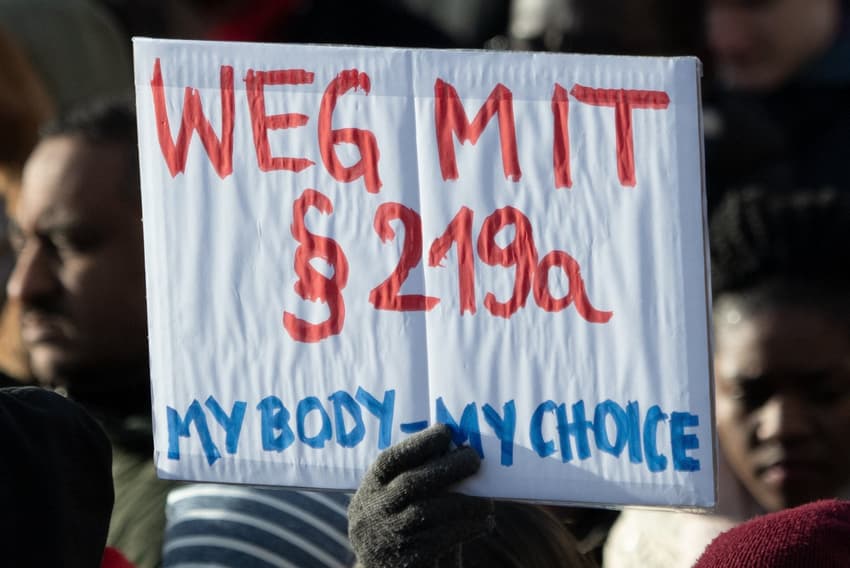Germany consigns Nazi-era abortion law to history

Germany's parliament on Friday agreed to remove a Nazi-era law that limits the information doctors and clinics can provide about abortion.
One of the most controversial sections of the penal code, Paragraph 219a, prohibits the "promotion" of abortion, a crime punishable by "up to two years of imprisonment or a fine".
The decision to finally consign the law to history came almost eight decades after its adoption in 1933, shortly after Adolf Hitler had taken power.
READ ALSO: Why Germany is planning to overhaul abortion information laws
"It is high time," Justice Minister Marco Buschmann said in parliament.
It is "absurd" and "no longer in step with the times" that doctors are not allowed to provide complete information on abortion while "every troll and conspiracy theorists" are free to spout their ideas about terminating pregnancies.
The ruling coalition of Buschmann's Free Democrats, as well as the Social Democrats and the Greens, had made a pledge to remove the law when they signed up to govern together.
The opposition Christian Democratic Union (CDU) and the far-right AfD voted against scrapping the law.
Elisabeth Winkelmeier-Becker of the CDU argued that while a woman may face difficulties because of an unwanted pregnancy, "we are also thinking of the child's right to live". She pointed this out as the "key difference" between the ruling coalition and her party.
German Health Minister Karl Lauterbach, of the Social Democrats, said the move was "overdue".
"It cannot be (the case) that doctors are criminalised when they inform women factually about the medical possibilities of abortions," he said.
Despite dating back to Germany's darkest history, the law was applied until recently. Courts handed out penalties to doctors for offering information on the internet about pregnancy terminations.
In some cases, the sites offered a simple statement that the gynaecologist carried out abortions, with no further details.
Among the doctors prosecuted in recent years is Kristina Hänel, a general practitioner from Giessen in western Germany, who became the face of the campaign to ditch the law after being fined €6,000.
Her legal battle sparked a media storm and turned a spotlight on the law.
Welcoming the decision, Hänel wrote on Twitter that it was "a great feeling: 219a becomes history".
"We can at last fully meet our professional obligation to inform thoroughly. Those affected can finally find factual and serious information on the internet."

A pro-choice counter protester at the "March for Life" demo in Berlin in September 2020. Photo: picture alliance/dpa | Jörg Carstensen
Obstacles remain
In June 2019, two gynaecologists in Berlin, Bettina Gaber and Verena Weyer, were each handed two-thousand-euro fines for the same offence.
Anti-abortion militants, who organise themselves online, are behind most of the legal complaints made against medical professionals, while one activist was recently convicted for comparing abortion to the Holocaust.
Under pressure from such campaigners, many medical practitioners have removed all relevant information from their websites and have declined to be included in family planning lists shared with women looking to end their pregnancies.
With Paragraph 219a now out of the way, some campaigners are now turning their eye to another related law - Paragraph 218 - which outlaws abortions unless they are carried out within the first 12 weeks of pregnancy and only under certain circumstances.
READ ALSO: Reader question - is abortion illegal in Germany?
Abortion is 'taboo'
Women wishing to have an abortion must have an obligatory consultation at an approved centre.
The aim of this discussion is to "encourage the woman to continue her pregnancy", even if in the end the choice was up to her.
After the consultation patients must wait through a "reflection period" of three days.
Around 100,000 abortions are carried out in Germany every year although the number has gone down in recent years.
The subject is still taboo in Germany, according to a number of gynaecologists, and can be like an obstacle course for patients, particularly in traditionally Catholic Bavaria.
In some parts of the vast southern state, no hospitals offer the procedure, with many people opting to cross the border to Austria instead.
Heidi Reichinnek of the far-left Linke party said Paragraph 218 remained a "fundamental problem" and must be struck off the statute book.
For now, Buschmann said both pieces of law should be treated distinctly. But Minister for Women Lisa Paus said it was important to "talk about 218".
READ ALSO: Do Germany’s planned changes on abortion go far enough?
By Hui Min Neo
Comments
See Also
One of the most controversial sections of the penal code, Paragraph 219a, prohibits the "promotion" of abortion, a crime punishable by "up to two years of imprisonment or a fine".
The decision to finally consign the law to history came almost eight decades after its adoption in 1933, shortly after Adolf Hitler had taken power.
READ ALSO: Why Germany is planning to overhaul abortion information laws
"It is high time," Justice Minister Marco Buschmann said in parliament.
It is "absurd" and "no longer in step with the times" that doctors are not allowed to provide complete information on abortion while "every troll and conspiracy theorists" are free to spout their ideas about terminating pregnancies.
The ruling coalition of Buschmann's Free Democrats, as well as the Social Democrats and the Greens, had made a pledge to remove the law when they signed up to govern together.
The opposition Christian Democratic Union (CDU) and the far-right AfD voted against scrapping the law.
Elisabeth Winkelmeier-Becker of the CDU argued that while a woman may face difficulties because of an unwanted pregnancy, "we are also thinking of the child's right to live". She pointed this out as the "key difference" between the ruling coalition and her party.
German Health Minister Karl Lauterbach, of the Social Democrats, said the move was "overdue".
"It cannot be (the case) that doctors are criminalised when they inform women factually about the medical possibilities of abortions," he said.
Despite dating back to Germany's darkest history, the law was applied until recently. Courts handed out penalties to doctors for offering information on the internet about pregnancy terminations.
In some cases, the sites offered a simple statement that the gynaecologist carried out abortions, with no further details.
Among the doctors prosecuted in recent years is Kristina Hänel, a general practitioner from Giessen in western Germany, who became the face of the campaign to ditch the law after being fined €6,000.
Her legal battle sparked a media storm and turned a spotlight on the law.
Welcoming the decision, Hänel wrote on Twitter that it was "a great feeling: 219a becomes history".
"We can at last fully meet our professional obligation to inform thoroughly. Those affected can finally find factual and serious information on the internet."

Obstacles remain
In June 2019, two gynaecologists in Berlin, Bettina Gaber and Verena Weyer, were each handed two-thousand-euro fines for the same offence.
Anti-abortion militants, who organise themselves online, are behind most of the legal complaints made against medical professionals, while one activist was recently convicted for comparing abortion to the Holocaust.
Under pressure from such campaigners, many medical practitioners have removed all relevant information from their websites and have declined to be included in family planning lists shared with women looking to end their pregnancies.
With Paragraph 219a now out of the way, some campaigners are now turning their eye to another related law - Paragraph 218 - which outlaws abortions unless they are carried out within the first 12 weeks of pregnancy and only under certain circumstances.
READ ALSO: Reader question - is abortion illegal in Germany?
Abortion is 'taboo'
Women wishing to have an abortion must have an obligatory consultation at an approved centre.
The aim of this discussion is to "encourage the woman to continue her pregnancy", even if in the end the choice was up to her.
After the consultation patients must wait through a "reflection period" of three days.
Around 100,000 abortions are carried out in Germany every year although the number has gone down in recent years.
The subject is still taboo in Germany, according to a number of gynaecologists, and can be like an obstacle course for patients, particularly in traditionally Catholic Bavaria.
In some parts of the vast southern state, no hospitals offer the procedure, with many people opting to cross the border to Austria instead.
Heidi Reichinnek of the far-left Linke party said Paragraph 218 remained a "fundamental problem" and must be struck off the statute book.
For now, Buschmann said both pieces of law should be treated distinctly. But Minister for Women Lisa Paus said it was important to "talk about 218".
READ ALSO: Do Germany’s planned changes on abortion go far enough?
By Hui Min Neo
Join the conversation in our comments section below. Share your own views and experience and if you have a question or suggestion for our journalists then email us at [email protected].
Please keep comments civil, constructive and on topic – and make sure to read our terms of use before getting involved.
Please log in here to leave a comment.